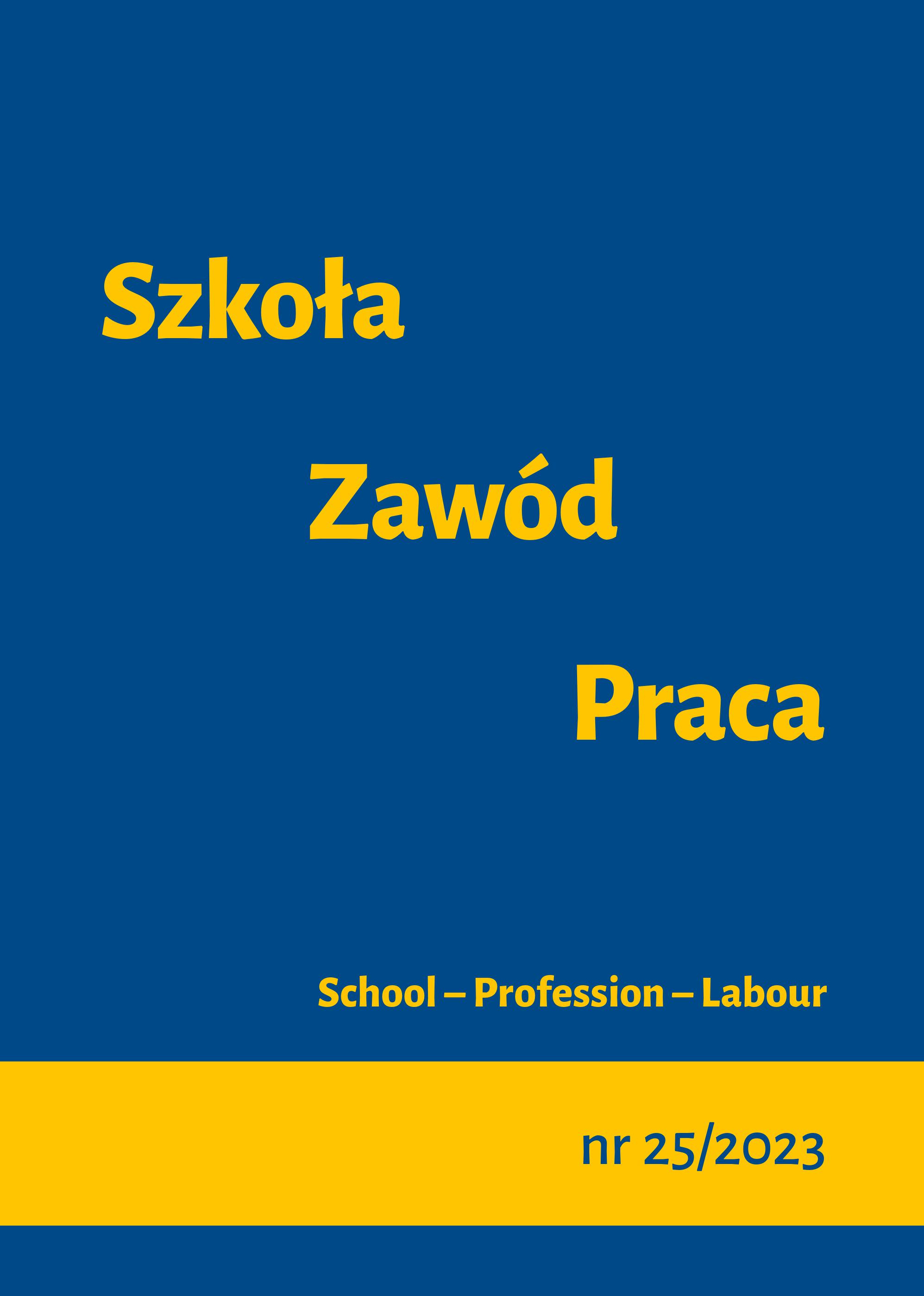Educational determinants of adults’ professional functioning in knowledge-based economy
DOI:
https://doi.org/10.34767/SZP.2023.01.03Keywords:
workplace learning, lifelong learning, adult learning, knowledge-, based economyAbstract
In this article, I deal with the problem of adult work-related learning in the knowledge-based economy. I put forward and try to prove the following four theses: (1) The concept of the “knowledge-based economy” should now be understood metaphorically, not literally. Due to the dynamic socio-economic changes, the practical implementation of the assumptions of the “knowledge-based economy” is not so much about knowledge, but about permanent learning in connection with work experiences. (2) In the knowledge-based economy, scientific knowledge is important, but personal knowledge and tacit knowledge are becoming more and more crucial. (3) The effective implementation of the concept of a knowledge-based economy and the understanding of its opportunities and risks cannot be an administrative, legal or economic matter only. The knowledge-based economy uses both the potential of (scientific) knowledge and the human potential for learning and development. Learners and their communities are the key, so research in this area is necessary in the field of social sciences, in particular pedagogy. Otherwise, the idea of a “knowledge economy” will blow up spontaneously, perhaps for the benefit of industry and multinationals, but not for the benefit of individuals. (4) In the knowledge-based economy, it is clear that it is necessary to start differentiating scientific theses about the educational dimension of work depending on the nature of this work. The general models and theses of learning in the workplace and work-related learning developed so far do not take into account the specificity of various professional activities. In this article, I deal mainly with pedagogical issues, but I sought to use scientific sources outside of pedagogy, looking in other scientific disciplines for what was pedagogically
important and inspiring, and so far not present in the pedagogical discourse.
References
Argyris, Ch., Schön D.A. (1996). Organizational learning II: Theory, method and practice. Reading: Addison-Wesley.
Bauman, T. (2005). Wstęp. W: T. Bauman (red.), Uczenie się jako przedsięwzięcie na całe życie. Kraków: Impuls.
Cavaleri, S., Seivert, S. (2005). Knowledge Leadership: The Art and Science of the Knowledge-based Organization. Oxford: Butterworth-Heinemann.
Corti, L., Thompson, P. (2007). Secondary Analysis of Archived Data, Qualitative Research Practice. In: C. Seale, G. Gobo, J. F. Gubrium, D. Silverman (eds.), Qualitative Research Practice. London ‒ Thousand Oaks ‒ New Delhi: Sage Publications.
Chodorek, M. (2012). Uwarunkowania zarządzania talentami w przedsiębiorstwie w kontekście teorii pozytywnego zarządzania. Toruń: UMK.
Drucker, P.F. (1993). Post-Capitalist Society. Oxford: Butterworth Heinemann.
Giddens, A. (2006). Socjologia, tłum. A. Szulżycka. Warszawa: Wyd. Nauk. PWN.
Hejnicka-Bezwińska, T. (2008). Pedagogika ogólna. Warszawa: WAiP.
Järvinen, A., Poikela, E. (2006). The Learning Processes in the Work Organization: From Theory to Design. In: E. Antonacopoulou and others (eds.), Learning, Working and Living.
Mapping the terrain of Working Life Learning. Palgrave Macmillan.
Jemieniak, D., Koźmiński K.A. (2012). Zarządzanie wiedzą. Warszawa: Wolters Kluwer.
Jeruszka, U. Praca ‒ zatrudnienie ‒ zatrudnialność: założenia dyskursu. Szkoła – Zawód – Praca, 21 (2021).
Karlsson, Ch., Johansson, B., Sough, R.R. (2006). Entrepreneurship and Dynamics in the Knowledge Economy. New York: Routledge.
Kietliński, K. (2009). Moralność gospodarki opartej na wiedzy. Warszawa: UKSW.
Kirschner, P.A., Sweller, J., Clark, R.E. Why minimal guidance during instruction does not work: An analysis of the failure of constructivist, discovery, problem-based, experiential, and inquiry-based teaching. Educational Psychologist, 41 (2006).
Kolb, D.A. (1984). Experiential learning: Experience as the source of learning and development. Englewood Cliffs, NJ: Prentice Hall.
Kucznik, K. (2019). Gospodarka oparta na wiedzy jako trend stymulujący zarządzanie Talentami. W: E. Gruszewska, M. Roszkowska (red.), Współczesne problemy ekonomiczne w badaniach młodych naukowców, tom III: Analizy makro – i mezoekonomiczne. Toruń: UMK.
Long-Sutehall, T., Sque, M., Addington-Hall, J. Secondary analysis of qualitative data: a valuable method for exploring sensitive issues with an elusive population? Journal of Research in Nursing, 16 (4). (2010)
Malewski, M. (2010). Od nauczania do uczenia się. O paradygmatycznej zmianie w andragogice. Wrocław: DSW TWP.
Mikuła, B. (2006). Organizacje oparte na wiedzy. Kraków: AE.
Neef, D., Siesfield, G.A., Cefola, J. (1998). The Economic Impact of Knowledge. Boston: Butterworth-Heinemann.
Niklewicz-Pijaczyńska, N., Wachowska, M. (2012). Wiedza – Kapitał ludzki – Innowacje. Wrocław: Prawnicza i Ekonomiczna Biblioteka Cyfrowa.
Nonaka, I., Takeuchi, H. (2000). Kreowanie wiedzy w organizacji. Jak spółki japońskie dynamizują procesy innowacyjne, tłum. E. Nalewajko. Warszawa: Poltext.
Panenka, A. (2004). Stan i perspektywy rozwoju gospodarki opartej na wiedzy w Polsce. W: M. Klamut, E. Pancer-Cybulska (red.), Polska w rozszerzonej Unii Europejskiej - uwarunkowania i perspektywy rozwoju. Wrocław: AE.
Paterson, B.L., Thorne, S., Canam, C., Jillings, C. (2001). Meta-Study of Qualitative Health Research: A Practical Guide to Meta-analysis and Meta-synthesis. London: Sage Publications.
Powell, W., Snellman K. The Knowledge Economy. Annual Review of Sociology, 30 (2004).
Rojek, M. Coworki, (akademickie) inkubatory przedsiębiorczości i startupy – nowe środowiska pracy i uczenia się dorosłych. Rocznik Andragogiczny, 28 (2021).
Schultz, T.W. (1981). Investing in People: The Economics of Population Quality. Berkley: University of California.
Senge, P. (2002). The Fifth Discipline. The Art and Practice of The Learning Organization. New York: Doubleday/Currency.
Sfard, A. On two metaphors of learning and the dangers of choosing just one. Educational Researcher, 27 (1998).
Szromik, A. (2013). Wstęp. W: G. Śmigielska (red.), Źródła konkurencyjności przedsiębiorstw handlowych w gospodarce opartej na wiedzy. Warszawa: Difin.
Sztompka, P. (2009). Socjologia – Analiza społeczeństwa. Kraków: Znak.
Toffler, A. (1990). Powershift: Knowledge, Wealth and Violence at the Edge of the 21st Century. New York: Bantam Books.
Watkins, K.E., Marsick, V.J. A framework for the learning organization. In: K.E. Watkins and V.J. Marsick (eds.), In Action: Creating the Learning Organization. Virginia: American Society for Training and Development, 1 (1996).
Watkins, K.E., Marsick, V.J. Summing up: demonstrating the value of an organization’s learning culture. Advances in Developing Human Resources, 5 (2). (2003).
Welfe, W. (red.). (2009). Makroekonomiczny model gospodarki opartej na wiedzy. Łódź: UŁ.
Wiśniewska, S. (2015). Zatrudnialność – pojęcie, wymiary, determinanty. Edukacja Ekonomistów i Menedżerów, 1 (35). (2015).
Woodall, J., Lee, M., Stewart, J. (2004). The knowledge revolution and the knowledge economy. The challenge for HRD. London: Routledge


